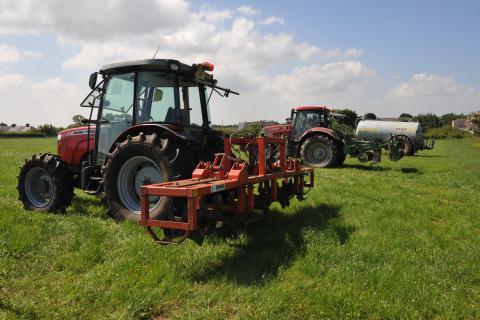29 June 2018
Exceptional soil pH values resulting from regular applications of lime is allowing a Pembrokeshire organic dairy farm to grow grass using only home-produced slurry and farmyard manure.
Soil acidity is an influential factor in forage production and Clovers Farm at Letterston is proof of what can be achieved if pH is at target levels.
The farm was converted to organic production in 2003 and recent soil tests revealed that pH levels in the 12 fields sampled ranged from pH 6.4 to 7 – the recommended target is 6.
The organic matter content in the soil ranged from 11-18% - more than twice the Welsh average - and nearly all the 12 fields tested showed phosphate (P) and potash (K) indices at target levels for grassland of 2 and 2- respectively.
During a Farming Connect open day at Clovers Farm, Farming Connect Arable and Horticulture Technical Officer Delana Davies described the results as “exceptional’’.
“It demonstrates what can be achieved if you make the best use of home produced resources,’’ she said.
The slurry at Clovers Farm was tested and shown to be 12.5% dry matter – at that value 1,000 gallons is worth £14.
Roger Ridgway farms 120-acre Clovers Farm with his wife, Moira, and her parents, Roland and Myfanwy Williams.
Their 75-cow crossbred herd yields 7000 liters at 4.4% butterfat and 3.3% protein from 1.5 tonne of organic cake fed in the parlour; milk is sold to Calon Wen.
Ten per cent of the farm is reseeded annually by planting forage rape to feed as a standing crop to cows in the winter followed by barley, peas and grass sown in the spring.
“Twice ploughing works, it reintroduces nutrients into the soil from the green organic matter that is ploughed into the soil,’’ said Mr. Ridgway.
Testing soils every three to five years allows farmers to understand the needs of their soils and should be regarded as an investment not a cost, according to independent agronomist Alan Jenkins.
Farming Connect supports farmers with up to 100% funding for analysing their soils. By applying to the Farming Connect Advisory Service, individual farms can receive 80% funding or, if they apply as a group of three or more, there is 100% funding.
pH is important for the efficient uptake of nutrients. “At 5.6 to 5.8 you will be losing money and fertiliser won’t be efficiently used. Lime is the building block, grass will still grow at 5.5 but there will be less nutrients available to the plant and grass yields will not be maximised," said Mr. Jenkins.
“Nitrogen and potash are the key nutrients that grassland require. If you have got the pH covered the plant can get the best uptake. You are wasting your time with phosphate if you haven’t got the pH right.’’
He recommended applying lime at a maximum of 2.5 tonnes/acre.
It is not only the soil chemistry that is important but its structure too. Following a very wet autumn and spring, many fields are compacted because they were trampled by livestock.
If water sits on the soil surface, Mr. Jenkins advised farmers to dig holes to assess soil structure. “Work out where the pan is, look at the soil, smell it, feel it,’’ he said. “Soils should be full of life but if there is no air that won’t be the case.’’
If soils are compacted an aerator can be used to make a slit in the soil to introduce air.
When and how slurry is applied influences the total percentage of nitrogen available to the plant.
Injecting slurry instead of surface application with a splashplate allows an additional 10% of nitrogen to be trapped.
If the slurry is injected in the spring, 45% of the nitrogen is available to the plant, in the summer 35% and the winter 30%. In contrast, splashplate application provides 35% in the spring, 25% in the winter and 25% in the summer.
As the discussion around possible new Nitrate Vulnerable Zones in Wales continues, Brian Klass of Natural Resources Wales warned farmers that they have a duty of care when it comes to when and how they apply their nutrients.
Watercourses in the Cleddau Catchment are sampled every month and the readings could be influential in future decisions regarding NVZs, he said.
The ‘Soil, Muck and Money’ series of events across Wales is coordinated by Farming Connect which is funded by the European Agricultural Fund for Rural Development and the Welsh Government.

